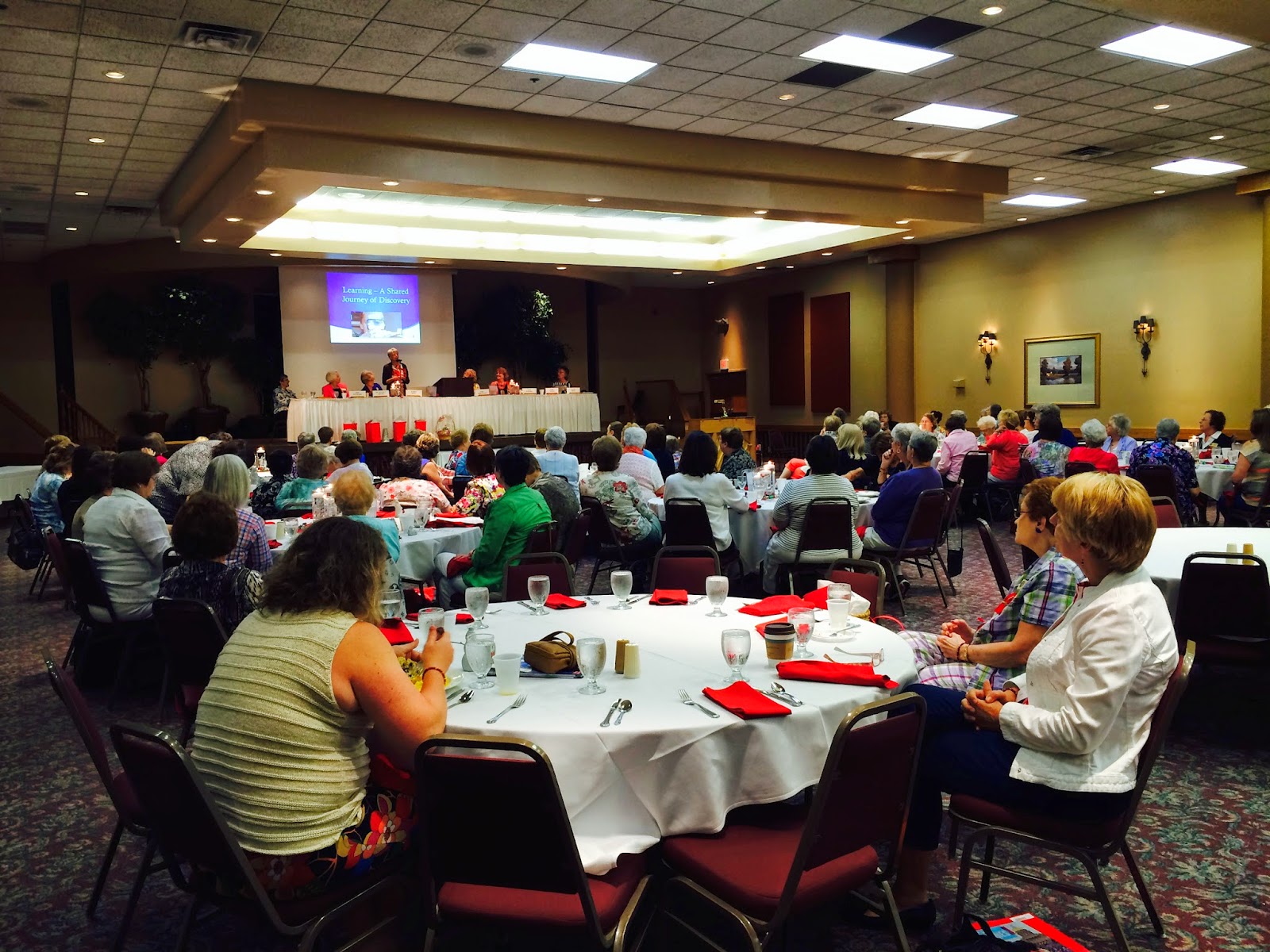What is DKG - Delta Kappa Gamma? Delta Kappa Gamma is an International Society for Key Women Educators. Their theme - "Sharing our Vision, Strengthening Our Society." On June 14, I was invited to serve on a panel discussion to answer the question, "How can volunteers make an impact on literacy?" Earlier in the week, I had attended the Upper Mississippi Conference on Poverty and listened several times to Ruby Payne speak. My approach to this question was with an eye on resolving difficult situations for families that will directly impact success in literacy.
 |
| Beverly Helms, International President of DKG, served as moderator |
| Other panelists included two instructional coaches from Davenport (Cindy Schollaert and Jolene Whittemore) and a Dean of Students/Counselor (Danelle Breier) from Bettendorf |
How can volunteers impact literacy?
The greatest way you can assist with literacy in
a home is to provide services to families in poverty. These services are should not be a HAND OUT but a HAND
UP. Across America 46 million live in poverty -15%
of our population. It is the highest it has ever been since they began keeping
records. In Iowa the poverty rate is
12.7% with the children poverty rate at 15.4%. The poverty training of
Ruby Payne known as “Bridges out of Poverty" provides many
simple ways that volunteers could assist schools with the growing issue of
poverty which, in turn, have potential to impact literacy. Those ideas shared include:
- Provide mentoring to a struggling
mother. Take her for coffee and simply
discuss how things are going for her.
This type of mentoring program could be set up through community
resources. People in poverty value
relationships more than they value getting out of their situation. It is when you are in a relationship, you can
offer tips to her about reading to her children. (Flapjacks, mentoring the malnourished)
-
In the schools many times organizations
give books to children. I would suggest
the first gift given is a bookshelf so they have a special place to keep their
books. In many of the homes there is
chaos, and a place to help with this organization of books would be beneficial.
-
Provide magnets to families with a saying about
literacy for refrigerators. This is
another organizational tool that would help keep spelling lists, vocabulary
work, homework in one spot.
-
Offer to eat lunch once a week with a
child. This could be a study lunch, a
time of relationship building, or a time to read together after eating. Some schools have a program where a student
read with a mentor then they either read after lunch or walk and talk.
-
Organize a backpack program that sends
home food with families for the weekend meals.
A child cannot concentrate on literacy if they are worried about where
their next meal is. (Theisen’s has organized one such program in Jackson County. Some schools title it "Pack a Snack."
-
Serve on a Habitat for Humanity committee
or board. Offer to assist a family in
completing the application and organize the necessary paperwork.
-
Provide a shared book experience with a
student. Offer to read the same book
s/he is reading and then via email, snail mail, or blog share a summary and perspective on the book. This provides a real-world application for
the reading.
-
Volunteer at the public library to assist students as a reading buddy.
Additional ideas include:
- Provide transportation to a mother to get
to her appointments. Transportation
difficulties are what keep many people in poverty in that situation. They have no way to travel to educational
opportunities. You might emphasize it is not a
hand out and in response she can do something for you. Does she have a craft she makes? Could she bake you something? Or you could tell her that when her situation
improves, she could "pay it forward."
-
Provide packets to parents of newborns
that contain flyers about the importance of reading along with a picture book.
-
Offer scholarships to parents to complete
their GEDs along with providing childcare while s/he participates in these classes.
-
Organize a “Getting Ahead in a Getting By
World” program in a neighborhood. This
is a Ruby Payne program providing guidance in organizing finances, identifying strengths and resources, understanding the hidden rules of social classes, and how to locate and apply for jobs. Usually organizations and churches unite to
provide supper with leftovers sent home to the families. Child care is also provided by
volunteers. Those participating leave with a plan to implement to assist with the difficult challenges they are facing.
On Sunday, June 15, I served as the keynote for their inspirational brunch. The topic of the speech: Learning - A Shared Journey of Discovery.
Over 150 attended this event. Until this weekend, I was not familiar with the DKGs but now I look forward to becoming a member. Beverly Helms, Delta Kappa Gamma International President, announced she was paying my dues for the first year. Now I just have to wait to see if they vote me into this group of passionate educators! Check this organization out at: https://www.dkg.org






Your writing style has been amazed me. Thank you, very nice post.
ReplyDeleteCalgary child care